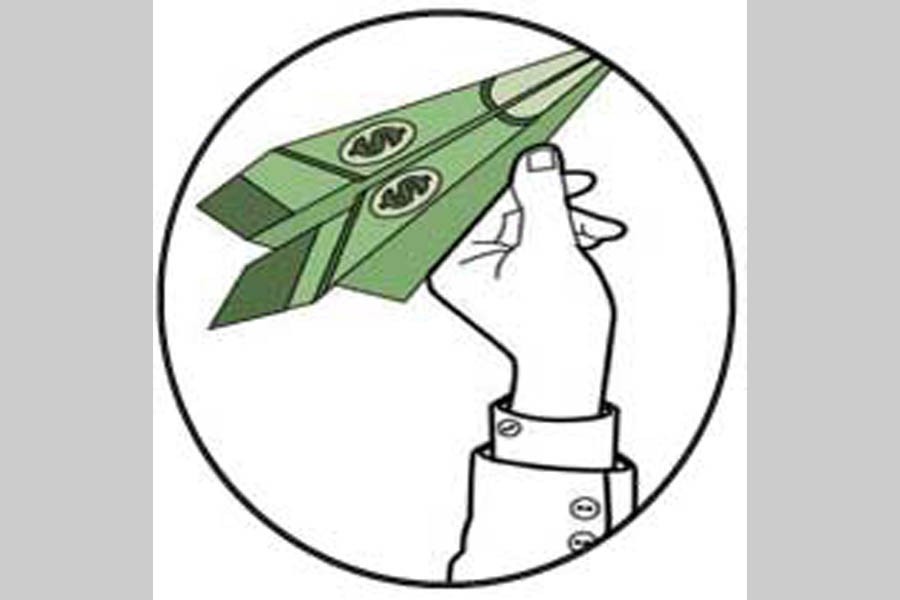Among the many financial crimes, common to financial regimes across the globe, the one that tears through the economic vertebrae of most countries, especially developing countries, is no doubt capital flight. In Bangladesh, for quite sometime now, capital flight, coined differently as money laundering, has emerged as a potentially unchallenged crime that the government has apparently little clue to deal with.
The issue, because of its enormity and scale, has been receiving media focus for quite a while -- set off by rough estimates made by international bodies about the money flown off the country over the years to so-called tax heavens and overseas financial institutions. There were moves, reportedly within the country, to combat the situation through collaboration of key state agencies such as the central bank, national board of revenue (NBR) and the law enforcement agencies, but unfortunately nothing in terms of hitting the target has so far been noticed. In fact, there were no targeted shots at all.
Capital flight often believed to be imbedded in the country's import practices is yet to face any tough challenge, although monitoring at various levels can identify the modus operandi and effectively take measures to stop the fraudulent activity. There were occasions in the past when this crooked practice was attributed to importing-fake for the most part or imports showing highly inflated bills through over-invoicing. One clear indicator that makes one suspicious is alleged imports that neither matches the demands of local market nor of the industrial sector. This was the case with sudden surge in 'import' of capital machinery a couple of years ago. The ground reality at that time did not suggest that imports actually took place or if at all, not in such huge volumes.
The last Least Developed Countries (LDC) Report released by the United Nations Conference on Trade and Development (UNCTAD) says that Bangladesh lost a significant amount of tax owing to illicit outflow of funds that accounted for 36 per cent of its total tax in 2015. The report said the ratio of illicit financial flows from Bangladesh was equal to the average for LDCs. Clearly, the country's tax collection would have increased substantially, had there been strong deterrence to prevent outflow of money on such a massive scale. In fiscal 2014-15, the tax authority of the country collected Tk 1357.0 billion and the UNCTAD's estimate showed that Tk 488.52 billion had flown out from the country illegally through various channels. Indeed, the most likely channel attracting huge sums of money is believed to be trade. As Debapriya Bhattacharya, distinguished fellow of the Centre for Ploicy Dialigue (CPD) has said that out of the illicit outflow of funds, 80 per cent is done through imports and exports.
At a workshop organised by the Bangladesh Institute of Bank Management (BIBM) on trade service operations, speakers have identified several factors responsible for the rise of trade-based money laundering in the country. The factors, as they said, include under-qualified bankers, lack of effective communications between the customs and banks, unholy alliance of unscrupulous traders and bankers, and lack of digitisation. They also found a correlation between the rise of non-performing loans (NPLs) and money laundering. Speakers also pointed out that non-ratification of the 'UN Vienna Convention on Contract of Sale' put the country's foreign trade at a grave risk, which also contributed to the rise of trade-based money laundering. However, one factor that did not seem to figure prominently is the lack or absence of overseeing mechanism by, among others, the central bank and the National Board of Revenue (NBR).
Call it money laundering or capital flight, it is well established that every year, reportedly, $6.0 to $9.0 billion fly away from the country, a major portion of which is orchestrated through manipulating invoices by way of over-invoicing.
How much money got laundered through various illegal channels is not known to the central bank. All that has been gathered are from published reports of several international agencies. A noted Washington-based research body Global Financial Integrity in its report 'Illicit Financial Flows (IFFs) to and from Developing Countries: 2005-2014' mentioned some US$61.63 billion having been laundered from Bangladesh during the period. According to the report, on an average, $6.16 billion was laundered every year during the period, and in 2013 the amount soared as high as to $9.66 billion.
The NBR and the central bank are obviously the agencies on which the onus is more than on any other agencies in this regard. Understandably, all it takes is close coordination between the two agencies, preferably by means of jointly tracking suspicious imports - from the stage of opening of letters of credit to clearance of goods. Beside the additional burden of import payments arising from the illegal practice, it is also responsible for discouraging investment at home.


